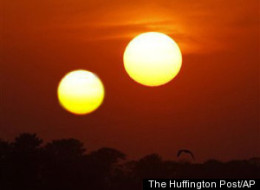 In the wake of the shootings in Tucson, the familiar questions inevitably resurfaced: Are communities where more people carry guns safer or less safe? Does the availability of high-capacity magazines increase deaths? Do more rigorous background checks make a difference?
In the wake of the shootings in Tucson, the familiar questions inevitably resurfaced: Are communities where more people carry guns safer or less safe? Does the availability of high-capacity magazines increase deaths? Do more rigorous background checks make a difference?
The reality is that even these and other basic questions cannot be fully answered, because not enough research has been done. And there is a reason for that. Scientists in the field and former officials with the government agency that used to finance the great bulk of this research agree in saying that the influence of the National Rife Association has all but choked off money for such work.

 Science Glance
Science Glance When is a kilogram not a kilogram? When it starts to weigh less. It came into existence more than two centuries ago and has become the standard unit of weight around the world, from the shopping malls of Europe to the souks of the Middle East, but scientists believe that the reign of the kilo as we know it is about to come to an end.
When is a kilogram not a kilogram? When it starts to weigh less. It came into existence more than two centuries ago and has become the standard unit of weight around the world, from the shopping malls of Europe to the souks of the Middle East, but scientists believe that the reign of the kilo as we know it is about to come to an end. The very reputation of so-called "science" has been irreparably damaged by the invocation of the term "science" by GMO lackeys, pesticide pushers, mercury advocates and fluoride poisoners who all claim to have science on their side. It seems that every toxin, contamination and chemical disaster that now infects our planet has been evangelized in the name of "science."
The very reputation of so-called "science" has been irreparably damaged by the invocation of the term "science" by GMO lackeys, pesticide pushers, mercury advocates and fluoride poisoners who all claim to have science on their side. It seems that every toxin, contamination and chemical disaster that now infects our planet has been evangelized in the name of "science." It's the ultimate experience for Star Wars fans - staring forlornly off into the distance as twin suns sink into the horizon. Yet it's not just a figment of George Lucas's imagination - twin suns are real. And here's the big news - they could be coming to Earth.
It's the ultimate experience for Star Wars fans - staring forlornly off into the distance as twin suns sink into the horizon. Yet it's not just a figment of George Lucas's imagination - twin suns are real. And here's the big news - they could be coming to Earth. Astronomers have discovered the smallest planet outside our solar system, and the first that is undoubtedly rocky like Earth. Measurements of unprecedented precision have shown that the planet, Kepler 10b,has a diameter 1.4 times that of Earth, and a mass 4.6 times higher.
Astronomers have discovered the smallest planet outside our solar system, and the first that is undoubtedly rocky like Earth. Measurements of unprecedented precision have shown that the planet, Kepler 10b,has a diameter 1.4 times that of Earth, and a mass 4.6 times higher. One of psychology’s most respected journals has agreed to publish a paper presenting what its author describes as strong evidence for extrasensory perception, the ability to sense future events. The decision may delight believers in so-called paranormal events, but it is already mortifying scientists.
One of psychology’s most respected journals has agreed to publish a paper presenting what its author describes as strong evidence for extrasensory perception, the ability to sense future events. The decision may delight believers in so-called paranormal events, but it is already mortifying scientists.






























